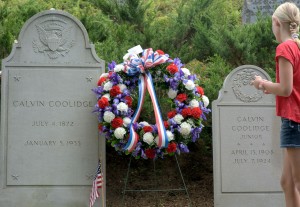
On October 6, 1925, President Calvin Coolidge delivered a speech in Omaha to the national convention of the American Legion.
He defended four concepts his audience – crucial Republican supporters in his successful 1924 campaign – did not necessarily favor:
-aspirations for peace & limits on military spending;
-enforcement of civil government’s control over military policy;
-restrictions on bonuses and insurance for veterans; and
–toleration of ethnic, religious and political diversity.
In a much-altered environment, Coolidge’s views and their context cast light on the national security and fiscal issues now confronting the country. In succeeding posts, I’ll look at each theme in turn.
Today, it’s peace and military spending.
***
To the assembled Legionnaires, ‘Silent Cal’ waxed oratorical. His first 1100 (of 5000) words praise WW I veterans and honor their service in the cause of ‘the war to end all wars’:
It is impossible to believe that any nation now feels that it could better itself by war, and it is apparent to me that there has been a very distinct advance in the policy of peaceful and honorable adjustment of international differences. War has become less probable; peace has become more secure.
Clearly Coolidge’s prophetic gifts were limited. But his commitment to ‘peaceful and honorable adjustment of international differences’ he was implementing.
Then came a domestic view of what John Maynard Keynes had called ‘the economic consequences of the peace‘:
Never before were contending peoples so well equipped with every kind of infernal engine calculated to spread desolation on land and over the face of the deep. Our country is only but now righting itself and beginning a moderate but steady recovery from the great economic loss which it sustained. That tremendous debt must be liquidated through the laborious toil of our people….
The boom we associate with the 1920s was preceded by a very sharp recession from 1920 to mid-1921 which itself had followed a mild downturn in 1919. The rapid redeployment of more than a million men in uniform and the influenza pandemic of 1918-19 (which Coolidge doesn’t mention) caused major dislocations. These only deepened Coolidge’s scepticism of war’s benefits:
Modern warfare becomes more and more to mean utter loss, destruction, and desolation of the best that there is of any people, its valiant youth and its accumulated treasure. If our country secured any benefit, if it met with any gain, it must have been in moral and spiritual values. It must be not because it made its fortune but because it found its soul.
Charles Dawes, Coolidge’s vice president from 1925 to 1929 earned his reputation trying to sort out the benefits some nations sought from the Great War. The reparations to the victors imposed on Germany Keynes had foreseen in 1919 would surely lead to another war. Dawes received the 1925 Nobel Peace Prize for his efforts.
***
Coolidge’s aspirations had significant opponents.
Four months earlier at a state convention of the Union veterans of the Civil War, the Grand Army of the Republic, its national Commander-in-Chief had criticised Coolidge (of which more in later blogs):
Colonel Hosely also called peace talk ‘nonsense’ and charged that propaganda for peace is bought by money from abroad to weaken the United States as it cannot defend itself.
With this, the President implacably disagreed:
Our country has a larger Army and a more powerful Navy, costing annually almost twice as much as it ever before had in time of peace…. The country can rest assured that if security lies in military force, it was never so secure before in all its history.
Coolidge deserves quoting as often – or more often – than Eisenhower on the ‘military-industrial complex’:
The real question is whether spending more money to make a better military force would really make a better country…. But I can see no merit in any unnecessary expenditure of money to hire men to build fleets and carry muskets when international relations and agreements permit the turning of such resources into the making of good roads, the building of better homes, the promotion of education, and all the other arts of peace which minister to the advancement of human welfare.
In his reliance on ‘international relations and agreements’ I hear the experience of a politician successful in both the legislative and executive branches.
***
The most significant proof – the choice of Dawes apart – came three years later, on August 27, 1928 when US Secretary of State Frank Kellogg and French Foreign Minister Aristide Briand signed the General Treaty for Renunciation of War as an Instrument of National Policy. The US Senate promptly ratified it 85-1. (See Steve McKeown, ‘The Day When War Was Outlawed’, ConsortiumNews.com, Aug. 18, 2013.)[1]
Kellogg received the 1929 Nobel Peace Prize for the Kellogg-Briand Pact and his many initiatives on international arbitration. Coolidge had appointed him in 1925, and he left office with Coolidge in March 1929. The Pact took effect four months later with 64 signatories.
The wars that quickly followed the Pact have made it something of a joke. But as Steve McKeown highlights, its aspiration had in the US support across the political spectrum.
As the Republican governor of Massachusetts Coolidge had supported Woodrow Wilson’s peace efforts at the end of World War I. The state’s senior senator, Henry Cabot Lodge (R-Mass.), no friend of Coolidge’s, led the successful opposition to the League of Nations.[2]
***

I think it no small irony that history has treated Wilson’s Fourteen Points and his efforts at Versailles with respect and regret for their futility, while Coolidge’s General Treaty for Renunciation of War is forgotten.
Wilson has gotten far more credit than he was due, Coolidge, far less, for maps of a peace that was not to be.
Notes
1. McKeown does not even mention Coolidge whose support Kellogg had.
2. William Allen White, A Puritan in Babylon: The Story of Calvin Coolidge (New York: MacMillan, 1938), pp. 143-44. White’s treatment of the Coolidge-Lodge relationship is fascinating and in places quite funny. White regularly reminds me how much distance smooths what were hilly contours.
Recent Comments